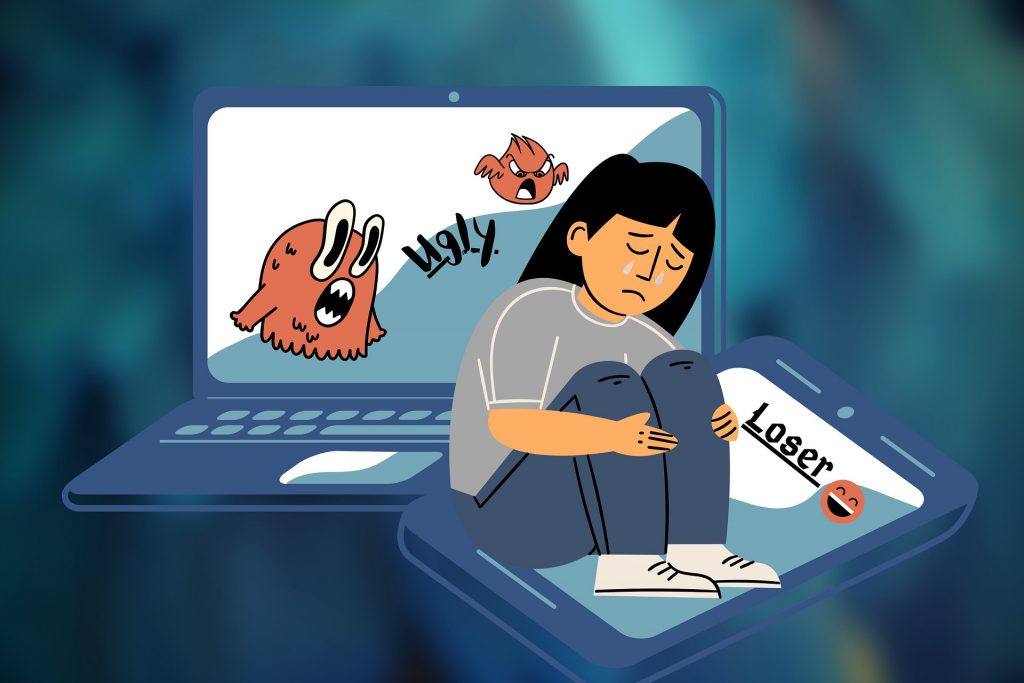The Ripple Effect: Unraveling the Impact of Cyberbullying on Kids and Young Adults
26 April 2023 | 5 mins read
- Staff resources
- Student resources
In the digital age, where technology and social media are an integral part of our lives, a new form of bullying has emerged—cyberbullying.

This insidious behavior can leave deep, lasting scars on kids and young adults, affecting their mental health, social lives, and academic success.
In this article, we will delve into the psychological and emotional effects of cyberbullying, discuss its academic and social implications, and examine strategies for prevention and intervention to protect and support those affected.
We aim to shed light on this growing issue and explore its far-reaching consequences. By understanding the various ways cyberbullying affects its victims, we can work together to create a safer, more inclusive digital environment that fosters empathy, understanding, and kindness.
Learn the best methods for protecting yourself against online bullying in our 20-page eBook. We'll give you a list of prevention tips, how to secure your communication online to prevent becoming a victim of online harassment, and give our best solutions and resources if you are a victim of online bullying.
What is cyberbullying, anyway?
At its core, cyberbullying is the act of using technology, such as smartphones, computers, and social media platforms, to harass, threaten, or target another person intentionally and repeatedly.
This digital harassment can take various forms, including spreading rumors, sending hurtful messages, or sharing embarrassing photos or videos.
Cyberbullying is a growing problem that’s hard to ignore. With the increasing use of technology and social media, instances of cyberbullying have become more frequent and pervasive. Kids and young adults are particularly vulnerable, as they often spend a considerable amount of time online, navigating the complex world of social connections and interactions.
Facing cyberbullying daily can have a significant impact on a young person’s mental health, self-esteem, and overall well-being.
It’s essential to understand the effects of cyberbullying to develop strategies that help protect and support those affected. By raising awareness and promoting empathy and kindness, we can work together to create a safer, more inclusive digital environment for everyone.
Related read: What is considered harassment? Types, signs, and examples
Psychological and Emotional Consequences
The psychological and emotional consequences of cyberbullying can be profound, leaving victims struggling to cope with the distress it causes.
Depression is a common outcome of cyberbullying, as victims may experience persistent feelings of sadness, hopelessness, or a lack of motivation.
They may lose interest in activities they once enjoyed and find it difficult to find pleasure in life. The emotional turmoil can be overwhelming, leading to a decline in their overall mental health.
Anxiety is another frequent consequence of cyberbullying.
Victims might experience constant worry, fear, or panic due to the harassment they face. They may become overly concerned about their online presence, always wondering when the next attack will come, and may even develop social anxiety as a result.

Cyberbullying can have a detrimental impact on a person’s self-esteem. Victims may feel unworthy, doubt their value, or develop a negative self-image. This erosion of self-worth can make it difficult for them to maintain healthy relationships and navigate social situations confidently.
As a result, social isolation and loneliness often follow cyberbullying. Victims might withdraw from social situations, fearing rejection or judgment from their peers. They may feel unwanted, misunderstood, or disconnected from their support networks, further exacerbating their emotional distress.
In severe cases, the emotional strain caused by cyberbullying can lead to suicidal thoughts or self-harm.
These are alarming signs that should never be ignored or dismissed, as they indicate the individual is in significant distress and needs immediate support and intervention. Understanding and addressing the psychological and emotional consequences of cyberbullying is critical to ensuring the well-being and safety of those affected.
Related read: Think you’re being harassed at school or work? Here’s how to verify
Academic and Social Implications
The impact of cyberbullying extends beyond the emotional realm, influencing a victim’s academic success and social life in various ways.
Academically, cyberbullying can negatively affect a victim’s performance in school. The emotional distress and anxiety caused by cyberbullying can make it difficult for victims to concentrate on their studies, leading to lower grades or missed assignments.
In some cases, victims may even choose to skip school to avoid the hostile environment, further hindering their academic progress.
Peer victimization can occur both online and offline, as cyberbullying can spill over into the real world. Victims may face additional teasing, exclusion, or even physical bullying from their peers, exacerbating their sense of isolation and vulnerability.

Social exclusion and stigma often follow cyberbullying, as victims may be unfairly judged or labeled by their peers. This can lead to further isolation, as the victim may feel alienated from their social circles and struggle to find acceptance and support.
Family relationships may also suffer as a result of cyberbullying. Parents may not know how to help or may be unaware of the extent of the problem, leading to tension and a lack of communication within the family.
The long-term effects of cyberbullying on social skills and future relationships cannot be underestimated. Victims may find it difficult to trust others or form healthy bonds, as they may fear further victimization or betrayal.
This can lead to ongoing difficulties in establishing and maintaining meaningful relationships, potentially impacting their overall quality of life.
Addressing the academic and social implications of cyberbullying is crucial for helping victims overcome these challenges and build a brighter future.
Mental Health and Resilience
Addressing the mental health needs of cyberbullying victims is vital for their recovery and long-term well-being. Taking steps to foster resilience can help victims overcome the challenges they face and regain control of their lives.
Therapy or counseling can be an essential resource for victims of cyberbullying. Licensed mental health professionals can provide guidance, support, and coping strategies tailored to each individual’s needs.
By engaging in therapy, victims can process their experiences, develop healthy coping mechanisms, and work toward emotional healing.
Resilience factors play a significant role in helping victims bounce back from the adverse effects of cyberbullying. A strong support network is crucial in providing emotional support and practical assistance. This network can include family members, friends, teachers, or mental health professionals.
Having someone to turn to when feeling overwhelmed or distressed can make a world of difference in the recovery process.
Developing coping strategies is another important aspect of building resilience. Victims can learn various techniques to manage stress, regulate their emotions, and navigate challenging situations effectively. These coping strategies might include mindfulness, deep breathing exercises, journaling, or engaging in physical activity.
Building self-esteem is critical for empowering victims to overcome the challenges posed by cyberbullying. Encouraging self-compassion, self-acceptance, and self-confidence can help victims recognize their inherent worth and value.
By fostering a positive self-image, victims can regain their sense of identity and assertiveness, allowing them to face and surmount the obstacles in their path.
Focusing on mental health and resilience can allow victims of cyberbullying to develop the tools and resources needed to heal, grow, and thrive in the face of adversity.
Prevention and Intervention Strategies
Addressing cyberbullying requires a multifaceted approach, involving education, awareness, and the active involvement of various stakeholders. Implementing prevention and intervention strategies can help create a safer online environment for kids and young adults.
Teaching kids and young adults about digital citizenship is crucial in fostering responsible and respectful online behavior.
Digital citizenship encompasses understanding the rights and responsibilities of online users, including privacy, safety, and respectful communication. Educating young people about the importance of treating others with kindness and empathy online can lead to a greater understanding of the impact of their actions, reducing instances of cyberbullying.
Parents play a critical role in preventing cyberbullying by monitoring their children’s online activities and engaging in open conversations about the issue. By establishing trust and maintaining an open line of communication, parents can encourage their children to report any incidents of cyberbullying they experience or witness.
Additionally, parents can help their children develop healthy online habits and establish boundaries for safe and responsible internet use.
Schools should implement comprehensive policies that address cyberbullying, providing clear guidelines for reporting and addressing incidents. Educators can also incorporate lessons on digital citizenship and empathy into the curriculum, promoting a culture of respect and understanding among students.
For victims of cyberbullying, reporting incidents and seeking help are essential steps toward addressing the problem. Speaking up about their experiences can help victims access support, prevent further harassment, and potentially protect others from similar experiences.
Moving Forward: Creating a Safer Digital Environment
Social media platforms and tech companies have a role to play. They should work to prevent cyberbullying and protect users. Encouraging positive online communities can make a difference. Supporting victims and promoting healing is vital.
Ongoing research and policy development can improve our understanding of cyberbullying. In conclusion, we must all work together to create a kinder digital world. By understanding the effects of cyberbullying, we can take steps to prevent it and support those affected.







